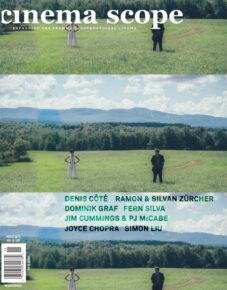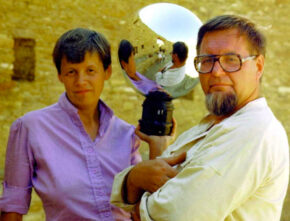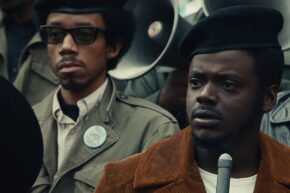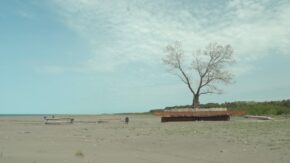CS86
Cinema Scope Issue 86 Table of Contents
By Cinema Scope | 04/05/2021 | CS86, From Cinema Scope Magazine, Table of Contents
The Cinema Scope Top Ten of 2020 Interviews *En plein air: Denis Côté on Hygiène sociale by Jordan Cronk *The Primacy of Perception: Ramon & Silvan Zürcher on The Girl and the Spider by Blake Williams Learning to Swim: Dominik Graf on Fabian – Going to the Dogs by Christoph Huber Hollywood Ending: Jim Cummings…
Read More → The Cinema Scope Top Ten of 2020
By Cinema Scope | 04/05/2021 | CS86, From Cinema Scope Magazine, Top Ten
1. Days (Tsai Ming-liang) 2. The Works and Days (of Tayoko Shiojiri in the Shiotani Basin) (C.W. Winter and Anders Edström) 3. The Year of Discovery (Luis López Carrasco) 4. The Last City (Heinz Emigholz) 5. Lovers Rock (Steve McQueen) 6. The Woman Who Ran (Hong Sangsoo) 7. Malmkrog (Cristi Puiu) 8. DAU. Degeneration (Ilya…
Read More → Sound of Metal (Darius Marder, US)
By Angelo Muredda | 04/05/2021 | CS86, Currency, From Cinema Scope Magazine
Entering Riz Ahmed in the disability cosplay sweepstakes as a young drummer coping with hearing loss, Darius Marder’s Sound of Metal originated as a lightly meta vehicle for husband-and-wife sludge-metal duo Jucifer to be directed by Derek Cianfrance, with whom Marder co-wrote The Place Beyond the Pines (2012). That the final result is more surprising than the rote uplift narrative suggested by its edifying logline is a testament to both Ahmed’s cagey intensity...
Read More → Exploded View: Steina & Woody Vasulka
By Chuck Stephens | 04/05/2021 | CS86, Exploded View, From Cinema Scope Magazine
Icelandic filmmaker Hrafnhildur Gunnarsdóttir’s extraordinarily warming 2019 documentary The Vasulka Effect, about the protean Euro-hippies and rightfully dubbed “grandparents of video art,” Steina and Woody Vasulka, was exactly the movie I needed to see this winter. Awash in Nordic echoes even as it confronts the modern realities of art-gallery politics and the history of America’s visual-arts fringes, it’s a mythical origin story that’s actually true, all about ancient heroes and ravaging time.
Read More → Canadiana | Reading Aids: The Good Woman of Sichuan and Ste. Anne
By James Lattimer | 04/05/2021 | Canadiana, CS86, From Cinema Scope Magazine
When navigating the as-yet-unknown films of a festival program, nationality still provides a persuasive point of reference for some, a feeling underlined by the proud declarations issued by national funding organizations, promotional bodies, or particularly partisan members of the press once titles have been announced. This year’s reduced Berlinale Forum lineup also invites tenuous lines of this kind to be drawn (two films from Argentina, two films from Canada!), although the three Franco-German co-productions shot elsewhere say far more about how films are made in 2021.
Read More → TV or Not TV | The Politics of Dancing: Adam Curtis’ Can’t Get You Out of My Head
By Jason Anderson | 04/05/2021 | Columns, CS86, From Cinema Scope Magazine, TV or not TV
With the arrival of any new Adam Curtis film comes a deluge of coverage, commentaries, analysis, harangues, point-counterpoints, fact checks, further-reading lists, and good old-fashioned snark spread across an ever-expanding plethora of platforms. The resulting cacophony makes one of the fundamental appeals of Curtis’ practice—his seeming ability to wrest a temporary sense of order and coherence from a dense matrix of ideas, factoids, fragments, and audiovisual ephemera from deep within the BBC archive that otherwise threatens to feel as disordered and disorienting as everyday life—seem all the more valuable.
Read More → DVD | Reclaiming the Dream: Joyce Chopra’s Smooth Talk
By Beatrice Loayza | 04/05/2021 | Columns, CS86, DVD Reviews, From Cinema Scope Magazine
Her reflection comes as a revelation. In the safety of her bedroom, Connie (Laura Dern), the 15-year-old protagonist of Joyce Chopra’s 1985 feature debut Smooth Talk (recently released on a Criterion Blu-ray), adjusts her new halter top in the mirror, its strings crisscrossed down the middle of her chest to hang limp over her exposed midriff. The camera observes her in profile as she spins and arches her back, her gaze glued to the supple body in the reflection, luxuriating in her new possession.
Read More → Gag Orders: The Trial of the Chicago 7 and Judas and the Black Messiah
By Andrew Tracy | 04/05/2021 | CS86, Features, From Cinema Scope Magazine
Bobby Seale makes a cameo of sorts midway through Judas and the Black Messiah, as Martin Sheen’s porcine J. Edgar Hoover—checking in personally on the progress of the FBI’s campaign against Chicago Black Panther Party chairman Fred Hampton (Daniel Kaluuya)—is shown an artist’s sketch of the BPP’s national chairman gagged and shackled in the courtroom during the Chicago Conspiracy Trial. This revolting spectacle understandably serves as the mid-film dramatic highpoint of The Trial of the Chicago 7, when the repeated, suitably indignant demands by Seale (Yahya Abdul-Mateen II) to serve as his own defense counsel in the absence of his hospitalized lawyer—and presiding judge Julius Hoffman’s (Frank Langella) incredible refusal to grant this right, instead directing that Seale’s defense should be undertaken by the representatives for the other defendants—ultimately lead to him being bodily removed from the courtroom by marshals and returned in chains. That image of a defiant Black man, forcibly silenced and immobilized in a hall of American justice, became one of William Burroughs’ “frozen moment[s] at the end of the newspaper fork,” when everyone—including those who would applaud it—can see what they’re being fed.
Read More → The Primacy of Perception: Ramon & Silvan Zürcher on The Girl and the Spider
By Blake Williams | 04/05/2021 | CS86, From Cinema Scope Magazine, Interviews
Near the midpoint of The Girl and the Spider—Ramon and Silvan Zürcher’s overdue, much anticipated follow-up to their masterful debut feature, The Strange Little Cat (2013)—a character launches into another of the Zürcher brothers’ distinctive anecdotal monologues. Mara (Henriette Confurius), who is as close as this film gets to a protagonist, describes for her neighbour, Kerstin (Dagna Litzenberger-Vinet), an incident that occurred the previous day between herself and her newly ex-roommate (and perhaps ex-girlfriend) Lisa (Liliane Amuat). “I was in my room while Lisa was on the toilet,” she recounts. “She asked me to bring her a roll of toilet paper. Instead of giving it to her, I walked past the door from left to right, from Lisa’s point of view.” The image cuts to the scene while she recalls it, privileging us with a more objective account of the incident: a fixed shot showing Mara stand up from her desk, grab a package of toilet paper, and march past the door, her arms outstretched like a zombie.
Read More → En plein air: Denis Côté on Hygiène sociale
By Jordan Cronk | 03/25/2021 | CS86, From Cinema Scope Magazine, Interviews
No mere pandemic film (the script was largely written in 2015), Côté’s latest instead turns our current circumstances into a means for reflection, analysis, and confrontation with the very tools and convictions that have made him into one of contemporary cinema’s most prolific and unclassifiable directors. At a time when the very concepts of serious-minded filmmaking and theatrical exhibition are being called into question by streaming giants and IP managers with zero investment in the sustainability of the art form, Côté proposes that what’s needed if the cinema is to survive is not a reckoning with the notion of what is or isn’t a movie, but a re-engagement with the tenets of an author-driven cinema, achieved on its own unique terms.
Read More → Journey to the Centre of the Earth: Fern Silva’s Itinerary
By Michael Sicinski | 03/25/2021 | CS86, Features, From Cinema Scope Magazine
Fern Silva’s films cannot be described as ethnography, personal/mythopoeic film, or essay filmmaking, although they often partake of all of those modes. Though his films are rooted in particular places and cultural spheres, they assiduously avoid the rhetorical or declarative traps of typical nonfiction filmmaking. Instead, they envelop the viewer in a diffuse but concrete ambiance, conveying the palpability of land and water, the weight of the air surrounding hills and trees. They represent a doubled physicality—the world as unavoidably there, inseparable from the cinematic substrate of 16mm filmmaking itself—and the result is a hybridized form of documentary “fiction,” in the classical Latin sense. Silva’s films are made, formed in the interface between reality and those human and mechanical processes that bring it into being.
Read More → Modern Mabuse: On Richard Kelly’s Southland Tales
By Josh Cabrita | 03/25/2021 | CS86, Features, From Cinema Scope Magazine
I suppose now is the time to justify why I thought it worthwhile to begin a piece on Richard Kelly’s Southland Tales (2006), whose Cannes cut has recently been released for the first time on home video courtesy of Arrow, with this exegesis of Lang’s final film. It’s not just that both Thousand Eyes and Southland Tales involve obscure conspiracy plots, take place in highly controlled and policed societies (the post-Nazi German surveillance state and the post-Patriot Act US, respectively), or examine complex information and transportation systems.
Read More → Editor’s Note: Cinema Scope Magazine Issue 86
By Mark Peranson | 03/25/2021 | Columns, CS86, From Cinema Scope Magazine
Is pandemic cinema a trend? Sure, because it ain’t a genre, and, one day—like a miracle—it will disappear. Pandemic cinema is appealing because anything can be pandemic cinema, and indeed everything now is. We can turn anything into PC because that’s what we desire, thanks in no small part to a culture that has fully accepted conspiratorial thinking. In this issue, though, there are films covered that one can point to as expressing something that hits on the contemporary condition and sticks—films that are mainly interior (people trapped in enclosed spaces, people’s lives subjected to strict regulation, both of which apply to the latest from the Zürcher brothers, The Girl and the Spider), or exterior (people expressing our collective will to be free of said enclosed spaces or ideologies and roam free, as in Dominik Graf’s Fabian), or both (Denis Côté’s Hygiène sociale, the ur-pandemic text, a term I use just to raise the hackles of its author).
Read More → Sundance 2021: In the Year of COVID
By Robert Koehler | 03/25/2021 | CS86, Festivals, From Cinema Scope Magazine, Spotlight
Now that the cinema world was a year into the COVID-19 pandemic, what movies would be done and available? Would anything premiering be worth a damn after sitting on the shelf for nearly 12 months? Were the good movies being held back in the hope that actual festivals would kick back into gear by, oh, late spring? (Hope springs eternal.) That last question was the one that really mattered, one that pestered the fall festivals of 2020 to a degree but which has now come down hard on festivals in early 2021, as the feeling (is it just a feeling?) grows that the pandemic is coming to the beginning of the end.
Read More → A Glitch in the Matrix (Rodney Ascher, US)
By Gabrielle Marceau | 03/25/2021 | CS86, Currency, From Cinema Scope Magazine
In 1977, Philip K. Dick gave a speech titled “If You Find This World Bad, You Should See Some of the Others,” in which he revealed that many of his dystopian novels weren’t the products of his imagination or dreams, but came from recovered memories of actual alternate worlds. Dick was entirely sincere, and this realization plagued him. Footage of this speech (and of Dick’s skeptical French audience) punctuate Rodney Ascher’s A Glitch in the Matrix, which explores the psychological and cultural impacts of that moment when science fiction seeps into our reality.
Read More → 















